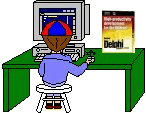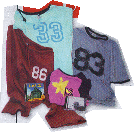What's New - October 2001
[Home]
|
October 31, 2001: Boo! Wish I had a ghostly program to post today, but I've been kind of occupied with maintenance stuff. The shared border problem is fixed -- the index on each program page is again complete. The Google search button has also returned to the bottom of the index column on Program pages.
October 20, 2001: What is the lowest number that can be divided by 6 with a remainder of 5; by 5 with remainder 4; and by 4 with remainder 3? (Mensa Puzzle Calendar, October 18, 2001). Or the original Chinese version:
The Chinese scholar, Sun Zi, provided a rather obscure poem about septuagenarians and plum trees as a solution (at best a hint, it seems to me). With or without poems as hints, Chinese Remainder problems seem quite difficult to solve without a computer. With Delphi we can solve them with this Beginner's level Chinese Remainder program of about 50 lines of code. A second longer version is included which does better error checking and allows larger problems to be solved We are still fighting problems with left shared borders in the Programs section. The Programs section home page has a complete index of program entries. The index on other program pages is missing at least the current Chinese Remainders entry.
October 15, 2001: A recent Business Week article discussed the current youth fad of clothing with numbers. That gave me the idea for a line of T-shirts with "interesting" numbers on the front and the reason that they are interesting printed on the back. Here's a sample shirt back: "The 3 digit number with the most divisors". What number appears on the front? Most Divisors is a beginners level program that provides the answer.
October 9, 2001: Page formats should be OK again. Some of you may have thought it was just lousy design that eliminated the index to other pages within the Programs, Delphi-Techniques and Math-Topics sections of our site. It was good design , just lousy implementation of a bright idea I had last week - but I now understand "Shared borders" and "Navigation bars". (I hope). Here's a program that solves the "9321 problem". Insert operators between the digits to form expressions that evaluate to 0,1,2,...,9. Operators are +, -, *, and /. So, for example, 9-3*2+1=4. Our program generates valid solutions by trying all 64 permutations of operators. October 1, 2001: Many of you puzzlers will recall that it takes 23 randomly chosen people to have a better than 50-50 chance that at least two share the same birthday. But what if those odds aren't good enough? How large a group will we need to be 90% sure that duplicate birthdays occur? The solution requires only about 5 lines of Delphi code. (well OK, 50 lines, but Delphi generates the most of them.) To get the code (and the answer to the question), check this Shared Birthdays Math Topics page.
|

 October
28, 2001: At last the
October
28, 2001: At last the 
